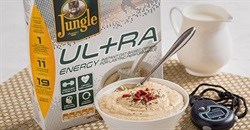
Top stories






More news


ESG & Sustainability
Redisa calls on govt to fix South Africa’s “broken” waste management system


























And then local food columnist and chef Andrea Burgener revealed in The Times this week that the dog biscuit her six-yearold had eaten was actually a better option than his usual bowl of cereal. A comparison of the ingredient lists revealed the biscuit had double the protein of most cereals, double the fibre and (very likely) less sugar.
But it gets worse. Turns out we may not be able to trust everything that's claimed on the cereal box. That includes marketing and labelling claims by South Africa's largest food manufacturer, Tiger Brands, which makes Tastic, All Gold, Black Cat and Koo.

The packaging and marketing of a cereal launched recently by Tiger, Jungle Ultra, appears to break the rules. Most notably, those laid down by the Department of Health.
Known as R146, the 2012 food labelling regulations outlaw a host of exaggerated, unsubstantiated and misleading claims.
Importantly, the regulations stop abuse and misuse of claims of health benefits.
Unfortunately, three years on, examples of noncompliant food labelling can still be found.
When a small manufacturer with limited resources and understanding gets it wrong, that's one thing. But when big business, with access to expensive consultants and lawyers, messes up, it's hard not to suspect that the law is being flouted simply for competitive advantage. And that's a big slap in the face for trusting consumers.
Jungle Ultra certainly pushes the boundaries. Tiger claims the multigrain cereal - which includes amino acids, vitamins and Omega 3 - lowers cholesterol and promotes heart health, helps the body recover and rebuild after exercise, and improves mental stamina and concentration.
Under R146, such claims of health benefits are completely out of line. New labelling regulations, which will allow limited health benefit claims, are pending, but these will be subject to prescribed wording and strict quantitative criteria.
So why is Tiger breaking the law? It's not, says spokeswoman Nevashnee Naicker. Tiger - bizarrely, in my view - doesn't believe that its statements count as health benefit claims. They're just "product information" for consumers, she says.
But after offering this defence, Naicker said Tiger had since "qualified the claims" and resubmitted new packaging to the Health Department for approval. It did this following rumours that the product was about to be pulled from the shelves, she said.
This week, Health Department spokesman Popo Maja said it had already discussed "issues of concern" with Tiger and had written a formal letter to the company after evaluating its labels. "Proposed corrections" were submitted, and are being studied.
"The department is unhappy with Tiger's labelling claims," Maja said. "It is our impression that Tiger is not being entirely open with us and may, to a large extent, be misleading the public with their claims."
Consumer activist, researcher and food consultant Dr Harris Steinman said companies making health claims on food products were abusing consumers and prejudicing competitors.
Food science consultant Nigel Sunley said Jungle Ultra's claims clearly contravened labelling regulations, because they made prohibited claims of health and curative benefits.
"I cannot understand how Tiger Brands can conceivably claim the product is compliant with current legislation . this is simply not the case," said Sunley. "It is seriously misleading consumers."
He said it was surprising behaviour from Tiger, which was "normally very good and ethical" in labelling practices.
Food lawyer Janusz Luterek agrees with Sunley. "Claims to restorative effects, prophylactic effects, and physiological effects which alter the normal manner in which the human body or mind reacts or recovers are health claims in terms of R146, and prohibited for ordinary foodstuffs such as cereals.
"Also, since such claims are prohibited, there is no process for the vetting or approval thereof by the Department of Health," Luterek said.
So why would Tiger risk breaking the law? Are marketing people riding roughshod over regulatory staff in the business? Or is Tiger taking advantage of weak enforcement of the regulations for as long as possible to establish its product in the market?
Tiger says it's committed to the "highest standards of corporate governance, ethical and moral business behaviour".
Said Naicker: "If the authorities are still not happy with our labelling, we'll do what is necessary. We're responsible . we are not out to mislead consumers."
I want to believe you, Tiger, I really do.

For more than two decades, I-Net Bridge has been one of South Africa’s preferred electronic providers of innovative solutions, data of the highest calibre, reliable platforms and excellent supporting systems. Our products include workstations, web applications and data feeds packaged with in-depth news and powerful analytical tools empowering clients to make meaningful decisions.
We pride ourselves on our wide variety of in-house skills, encompassing multiple platforms and applications. These skills enable us to not only function as a first class facility, but also design, implement and support all our client needs at a level that confirms I-Net Bridge a leader in its field.
Go to: http://www.inet.co.za